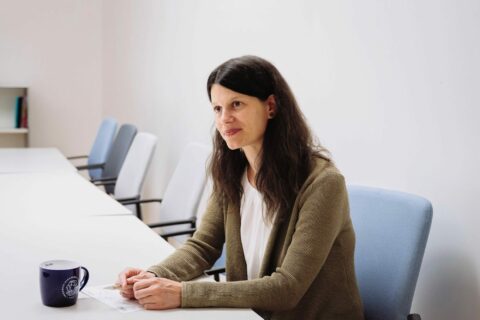Face-to-face teaching in the digital world
How online formats and on campus teaching go well together
Digital education works very well if it is based on well-founded teaching methods, says Svenja Bedenlier. This applies both to courses held solely online and to various teaching formats used in digitally-supported face-to-face teaching.
Online classes and events became the norm at FAU during the Covid pandemic. It became par for the course that students and staff only saw each other on the gallery view in Zoom. The switch to digital education happened extremely quickly and generated new opportunities for rapidly sharing information, networking and increased flexibility as regards time and location. However: “What became known as emergency remote teaching did work, but it cannot be compared to online classes that use well-founded online teaching methods that are planned over a long period of time,” says Svenja Bedenlier, Professor of E-Learning in Higher Education and Adult Education at the Innovation in Learning Institute (ILI) at FAU. “People need people for direct, immediate and personal interaction and this also applies to teaching and learning as constructive and interactive processes.” In addition, physically being on campus is essential for some concepts, for discussions and academic socialization, says Bedenlier.
Merging digital and analog formats
ILI provides support to teaching staff and practical advice on digital education. New forms of designing teaching methods and encouraging student engagement have been created, such as flipped classrooms or hybrid classes that take place at the University and online. “Digital formats are here to stay, we now have to focus on developing them further. Hybrid teaching especially shows that digital and analog formats are not polar opposites, but merge into each other,” explains Bedenlier. This requires students and teaching staff to learn new skills. “Teaching staff are expected to have skills for which they have not received any training for the most part, such as making videos, recording voice-overs or familiarizing themselves with the wide range of digital tools available. Supporting the development of these skills is an important task for ILI.”
Covid led to stress
The FAU e-learning monitoring survey, which was an interdisciplinary accompanying research project during the first two “Covid semesters”, showed that self-regulated learning was a major challenge for students during the pandemic. “A small percentage of students did not have the right technical equipment, which led to disadvantages for some individuals. In addition, the survey said that students’ stress levels increased as early as the middle of the summer semester of 2020 and satisfaction with studying decreased,” says Svenja Bedenlier.
AI: Potential and questions to be answered
As far as the future of teaching and studying at FAU is concerned, education specialist Bedenlier believes that “artificial intelligence and forms of extended reality will play a greater role. Blended learning will continue to exist, since teaching online and face-to-face will remain closely connected to each other.” Svenja Bedeliner is ambivalent about the development of the use of artificial intelligence in university-level teaching. While it may have interesting potential for teaching methodology and student support on the one hand, on the other, AI raises ethical and legal issues that still need to be clarified.
by Susanne Stemmler
Know-how for digital education
The Innovation in Learning Institute (ILI) is FAU’s center for digital education. With 30 administration and research staff, it carries out research into digital education and provides comprehensive advice and support for the development and implementation of digital education. ILI provides advice to FAU teaching staff with implementing the teaching methodology, technical and organizational matters of digital teaching and examination scenarios and provides support with the evaluation and quality control of digital teaching formats. The institute is part of a large network of European and German partners.
This article is part of the FAU Magazin

A university thrives because of the people who research, study, teach and work there. A university is supported by people who are connected to it as alumni, friends and sponsors and who are committed to promoting its interests all over the world.
They all contribute their unique talents, skills and perspectives. It is this diversity that makes our FAU a place of innovation, a place where many talented individuals tackle the major challenges of our times together, and a place where they keep finding answers.
Read more articles online Download: FAU Magazin (PDF)

